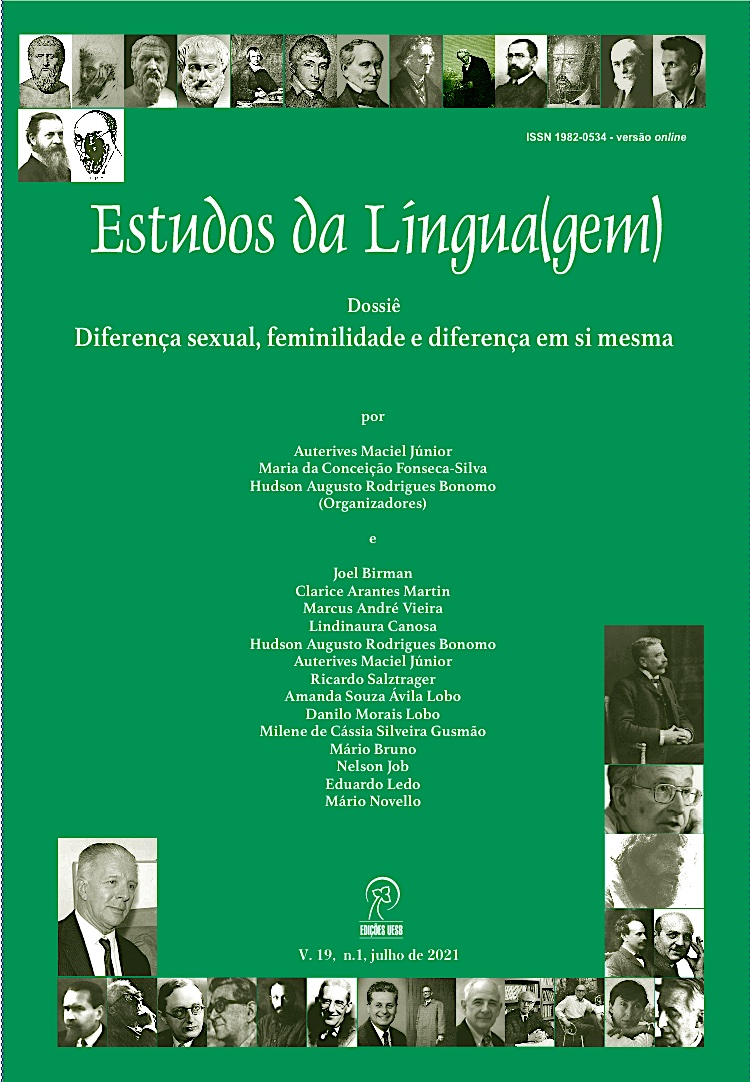Do dispositivo da sexualidade ao direito à diferença (From the device of sexuality to the right to difference)
DOI:
https://doi.org/10.22481/el.v19i1.9151Palavras-chave:
Dispositivo; Sexualidade; Biopoder; Resistência e ética.Resumo
Ao analisar os dispositivos de sexualidade, as relações de saber e poder que eles incluem, o biopoder e as práticas de resistências derivadas de tais procedimentos normativos, Michel Foucault construiu uma ética das relações consigo, buscando uma explicação conceitual para a origem ou fonte das resistências encontradas na contrapartida das demais relações de sujeição. Todavia, na sua pesquisa histórica as relações consigo foram explicitadas nas análises empreendidas por ele no meio grego e romano; mas as condições efetivas de tais relações no mundo atual não foram descritas dado o falecimento prematuro do referido autor. Pois bem, neste texto buscamos as condições de possibilidade das relações consigo no mundo atual, para construirmos uma ética do direito à diferença, consolidando-a na contrapartida dos discursos identitários e coercitivos ditados pelos dispositivos de poder.
Downloads
Referências
AGAMBEN, G. O que é um Dispositivo? In: O que é o Contemporâneo e outros ensaios. Chapecó: Ed. Argos, 2009. Trabalho original: 2005.
DELEUZE, G. Diferença e Repetição. São Paulo: Ed. Graal, 2006. Trabalho original: 1968.
DELEUZE, G. Foucault. São Paulo: Ed. Brasiliense 2005. Trabalho original: 1986.
DELEUZE, G. O que é um Dispositivo? In: Dois Regimes de Loucos. São Paulo: Ed. 34 letras, 2016. Trabalho original: 1988.
FOUCAULT, M. Surveiller et Punir. Paris: Ed. Gallimard, 1975.
FOUCAULT, M. Vigiar e Punir. Petrópolis: Ed. Vozes, 1987.
FOUCAULT, M. Histoire de la Sexualité: I La Volonté de Savoir. Paris: Ed. Gallimard, 1976.
FOUCAULT, M. História da Sexualidade 1 – A Vontade de Saber. São Paulo: Ed. Graal, 2006.
FOUCAULT, M. Histoire de la Sexualité: II L’ usage de plaisir. Paris: Ed. Gallimard, 1984.
FOUCAULT, M. História da Sexualidade 2 – O Uso dos Prazeres. São Paulo: Ed.Graal, 1988.
FOUCAULT, M. Histoire de la Sexualité: III Le Souci de Soi. Paris: Ed. Gallimard, 1984.
FOUCAULT, M. História da Sexualidade 3 – O Cuidado de Si. São Paulo: Ed. Paz e Terra, 2014.
FOUCAULT, M. Dits et Écrits Vol. III – Paris: Ed. Gallimard, 1994.
VEYNE, P. Foucault – O Pensamento, a Pessoa. Lisboa: Edições Texto & Grafia, 2009.
Downloads
Publicado
Como Citar
Edição
Seção
Licença
Copyright (c) 2021 Estudos da Língua(gem)

Este trabalho está licenciado sob uma licença Creative Commons Attribution 4.0 International License.
Autores que publicam em Estudos da Língua(gem) concordam com os seguintes termos:
Estudos da Língua(gem) mantém os direitos autorais das contribuições publicadas e disponibiliza seu conteúdo gratuitamente por meio do portal. Autores têm permissão e são estimulados a publicar e distribuir seu trabalho online em repositórios institucionais ou na sua página pessoal, com reconhecimento de autoria e créditos de publicação inicial nesta revista, indicando endereço online.






